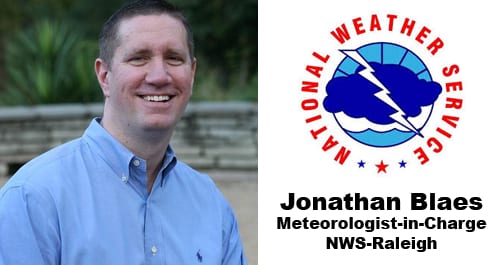As a meteorologist, Jonathan Blaes is a scientist well-versed in the vagaries of weather, especially in North Carolina and especially in the springtime. But next week, he just may divert his attention – for a few minutes, anyway – to observe a celestial event that has nothing to do with storms, or clouds or rain or anything else weather-related.
It’s the solar eclipse that will have his attention on Monday afternoon, which he called “a remarkable and really ‘far out’ kind of thing.”
The official forecast from Blaes, meteorologist-in-chief at the National Weather Service in Raleigh: observers in North Carolina won’t see the most dramatic show when the eclipse occurs roughly at 3:15 p.m., but they will have clear skies and fair temps to make viewing more pleasant.
“It’s certainly going to be a neat event,” he said on Thursday’s TownTalk, “but be careful.”
Although the sun will seem a little bit less powerful during the eclipse because the moon is in the way, its harmful UV rays can still cause damage, so please do NOT look skyward during the eclipse.
Blaes offered an alternative to the traditional pinhole cameras and special glasses for those who want to experience the eclipse in a safe manner: Go for a walk in a wooded area.
“As you walk underneath the trees, you’ll see a crescent shape of the sun on the ground,” he said. It’s Mother Nature’s version of that pinhole camera – the leaves of the trees will create miniature eclipse sun images, he said. “It’s one of the neatest things I’ve ever experienced.”
As a scientist, Blaes said he’s experienced a lot of what Mother Nature throws at North Carolina over the course of a year – springtime storms and rotations aloft that can create tornadoes are just a couple of types of weather that keep him and others at the National Weather Service on their toes.
He said this spring, folks in this area can expect conditions this spring to be “a little bit warmer and a little bit wetter” than normal. Sure, anyone can predict that, but Blaes and his team have analyzed tremendous amounts of data to come up with such a simple-sounding pronouncement.
“Being a meteorologist is fun,” Blaes said. “It is challenging – every day is a puzzle.” The surge in data from satellite images and other sources produces more information than humans can manage, he said, so he and his team rely on statistics and AI – all of which contribute to improved weather forecasts.
CLICK PLAY!
